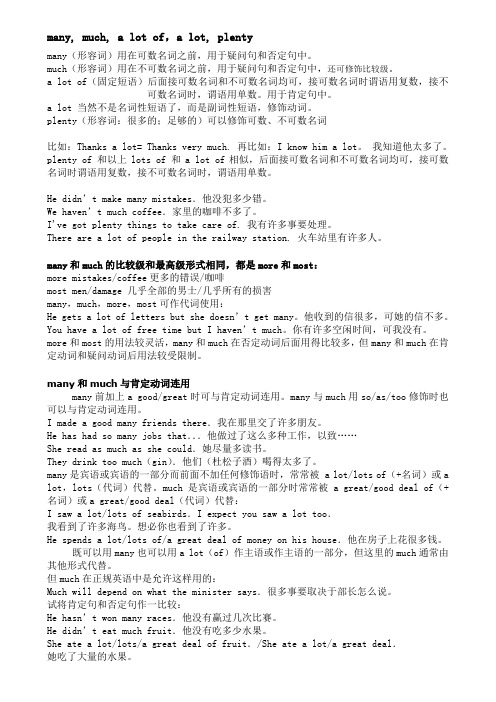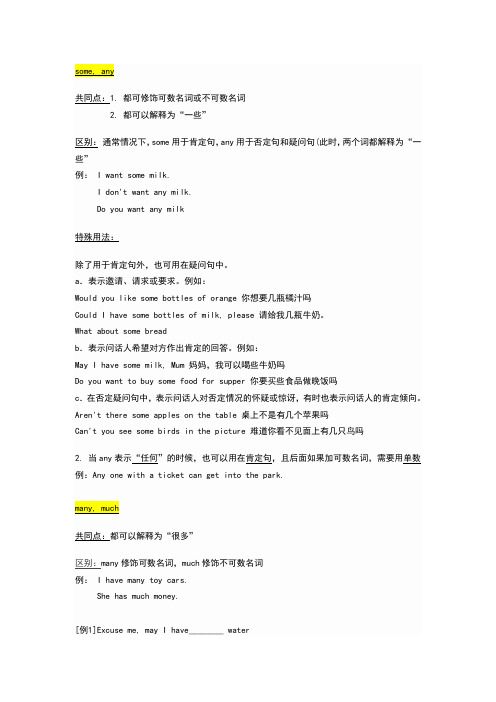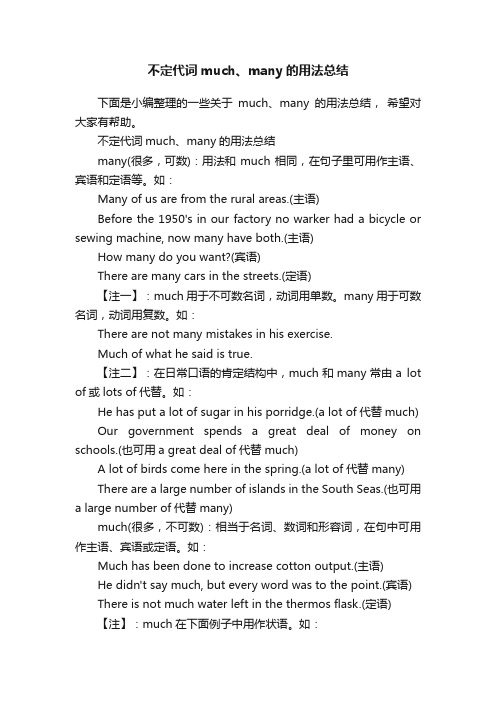lotof与many、much词语难点解析
英语修饰词的用法

many, much, a lot of,a lot, plentymany(形容词)用在可数名词之前,用于疑问句和否定句中。
much(形容词)用在不可数名词之前,用于疑问句和否定句中,还可修饰比较级。
a lot of(固定短语)后面接可数名词和不可数名词均可,接可数名词时谓语用复数,接不可数名词时,谓语用单数。
用于肯定句中。
a lot 当然不是名词性短语了,而是副词性短语,修饰动词。
plenty(形容词:很多的;足够的)可以修饰可数、不可数名词比如:Thanks a lot= Thanks very much. 再比如:I know him a lot。
我知道他太多了。
plenty of 和以上lots of 和a lot of相似,后面接可数名词和不可数名词均可,接可数名词时谓语用复数,接不可数名词时,谓语用单数。
He didn’t make many mistakes.他没犯多少错。
We haven’t much coffee.家里的咖啡不多了。
I've got plenty things to take care of. 我有许多事要处理。
There are a lot of people in the railway station. 火车站里有许多人。
many和much的比较级和最高级形式相同,都是more和most:more mistakes/coffee更多的错误/咖啡most men/damage 几乎全部的男士/几乎所有的损害many,much,more,most可作代词使用:He gets a lot of letters but she doesn’t get many。
他收到的信很多,可她的信不多。
You have a lot of free time but I haven’t much。
你有许多空闲时间,可我没有。
more和most的用法较灵活,many和much在否定动词后面用得比较多,但many和much在肯定动词和疑问动词后用法较受限制。
辨析plentyofalotoflotsofmany与much-学易试题君之每日一题君2018学年九年级英语人教版(上学期期末复习)

1 2018年1月10日
辨析plenty of, a lot of, lots of, many 与much
中考频度:★★★★☆ 难易程度:★★★★☆
(2016﹒黑龙江大庆)It was careless ______ Lingling to make ______ mistakes.
A. for; a lot of
B. of; a plenty of
C. for; an amount of
D. of; a number of 【答案】
D
【易混辨析】 辨析plenty of, a lot of, lots of, many 与much
(1)plenty of ,a lot of 与lots of 既可以修饰可数名词的复数形式,也可以修饰不可数
名词。
I have seen a lot of / lots of / plenty of English films.
我已经看了许多部英文电影。
(2)many 后面接可数名词复数形式。
The boy has plenty of / a lot of/ lots of / many pictures.
这男孩有许多图画。
I doubt whether / if there ’ll be many people at the show on this rainy day.
我怀疑在这个雨天里会有很多人看表演。
(3)much 后面接不可数名词。
It took me plenty of / a lot of / lots of/ much time to finish it.。
英语易混词语辨析

英语易混词语辨析
1.some一般用于肯定的陈述句中,any多用于否认句、疑问句或条件句中。
两者都可修饰可数名词,也可修饰不可数名词。
例如:There is some water in the cup.
Do you have any friends in Shanghai?
If you have any help, let me know.
2.在疑问句中有时也用some,表示希望得到肯定的答复或表示请求、建议、命令等含义。
例如:Would you like some more tea?
3.any也可以用在肯定陈述句中或条件状语从句中,表示任何的、任何一个的,其后接名词单数形式。
例如:Jim runs faster than any other student in his class.
1.few, a few修饰可数名词复数形式,little, a little 修饰不可数名词。
2.a few,a little有肯定含义,译作有几个,有一点;而few 和little表否认,译作没有几个,没有多少。
many, much和a lot of/lots of
都是许多的意思,many后接可数名词复数形式,much后接不可数名词,a lot of/lots of后接可数名词复数形式或不可数名词都可以。
each对两个或两个以上的人或物而言,侧重于个体,且可单独作主语、宾语等;every是对三个或三个以上的人或事物而言,侧重整体情况,且不能单独使用,只能做修饰词。
“许多”的英语表达方法-归纳总结

For personal use only in study and research; not for commercial useFor personal use only in study and research; not for commercial use表示“许多,很多”的词组按其用法归类:1.很多的many 修饰可数much 修饰不可数a lot of =lots of 修饰可数,不可数均可plenty of 修饰可数,不可数均可,一般用于肯定句中a number of 修饰可数the number of 的意思是“某物的数量”不是许多的意思,这个某物肯定是可数的,要不哪里来的数量2.很少的:a little 修饰不可数a few 修饰可数3.几乎没有:little 修饰不可数few 修饰可数4.一些:some any 都可以修饰可数和不可数一、只能修饰名词复数形式many、 a great/good many 、agreat/large number of 、scores of、dozens of和(quite )a few ,这类“许多”修饰作主语的名词时,谓语动词用复数There are a great/good many English books in our school library.A great number of my friends have been to the Great Wall.Scores/Dozens of people were killed in the accident.I have made quit a few good friends,too.Many of them have watched the TV play.A great many of us like American English better than British English. the number of + n (可数名词复数)表示"....的数目”,用它做主语时,谓语用单数The number of the students in our class is 55.二、只能修饰不可数名词的“许多” much、a great / good deal of 和a large amount of ,这类“许多”修饰主语名词时候,谓语用单数eg I don't know they gave us much help.There is a great/good deal of snow on the ground.I spend a large amount of money on books every month.Much has been said about it .a great deal 做名词词组和副词词组,也表示“大量,许多”/ 还可以修饰比较级,表示程度。
lots of,plenty of,many,练习题

lots of,plenty of,many,much,a lot,a lot of练习题用法:1、many和much都表示“许多”但many修饰或代替可数名词(复数)与few(少数)相対,much用来修饰或代替不可数名词(单数),与little(少量)相对;much还可以修饰动词,many 不行;much还可以修饰比较级many也不行;2、lots of和a lot of都有“许多,大量”的意思,与many用法相同,后面跟可数名词复数;lots of和a lot of在一般情况下可以互相通用,但lots of会用在比较口语的场合,而a lot of则会用在比较正式的场合;3、a lot的意思是“非常多”,词性为副词,用来修饰动词,在句子中充当状语成分;4、plenty of译为“大量的,充裕的”,用来修饰可数名词和不可数名词,用法与a lot of/lots of 相同;—般来说,plenty of用于肯定句中。
一、选择题1.There_____a lot of water in the river.A.isB.areC.wereD.be答案:A2.He has_____money and often goes shopping.A.a lotB.a lots ofC.lots ofD.many答案:C3.There will be___hot water.A.a lotB.manyC.lots ofD.lot of答案:C4.—You look very tired this morning.what did you do yesterday afternoon?—I did___Christmas shopping.A.a lot ofB.a few ofC.a number ofD.a piece of答案:A5.It was careless of Mary to make___mistakes.A.a lot ofB.a plenty ofC.a number ofD.an amount of 答案:C6.My cousin is___heavy because he often eats___fast food.A.too much;too manyB.too much;much tooC.much too;too muchD.too many;too much答案:C二、填空题(用much/many/a lot/a lot of填空)1.Tom caught a cold yesterday.But he feel____better now.答案:much2.There aren’t________eggs in the refrigerator.答案:many/a lot of3.How______pears do you want?答案:many4._______of us like playing football.答案:many5.We can learn______from these books.答案:a lot6.How______fruit would you like to buy?答案:much7.There isn’t_______water in the glass.答案:much/a lot of8.John is______higher than Lisa.答案:much。
some,any,many,much,little,few

some, any共同点:1. 都可修饰可数名词或不可数名词2. 都可以解释为“一些”区别:通常情况下,some用于肯定句,any用于否定句和疑问句(此时,两个词都解释为“一些”例: I want some milk.I don't want any milk.Do you want any milk特殊用法:除了用于肯定句外,也可用在疑问句中。
a.表示邀请、请求或要求。
例如:Would you like some bottles of orange 你想要几瓶橘汁吗Could I have some bottles of milk, please 请给我几瓶牛奶。
What about some breadb.表示问话人希望对方作出肯定的回答。
例如:May I have some milk, Mum 妈妈,我可以喝些牛奶吗Do you want to buy some food for supper 你要买些食品做晚饭吗c.在否定疑问句中,表示问话人对否定情况的怀疑或惊讶,有时也表示问话人的肯定倾向。
Aren't there some apples on the table 桌上不是有几个苹果吗Can't you see some birds in the picture 难道你看不见面上有几只鸟吗2. 当any表示“任何”的时候,也可以用在肯定句,且后面如果加可数名词,需要用单数例:Any one with a ticket can get into the park.many, much共同点:都可以解释为“很多”区别:many修饰可数名词,much修饰不可数名词例: I have many toy cars.She has much money.[例1]Excuse me, may I have________ waterA. aB. someC. anyD. an分析:此题中的water一词是不可数名词,前面不能用a或an;不定代词some在这里表示建议,请求或盼望得到肯定回答。
不定代词much、many的用法总结

不定代词much、many的用法总结下面是小编整理的一些关于much、many的用法总结,希望对大家有帮助。
不定代词much、many的用法总结many(很多,可数):用法和much相同,在句子里可用作主语、宾语和定语等。
如:Many of us are from the rural areas.(主语)Before the 1950's in our factory no warker had a bicycle or sewing machine, now many have both.(主语)How many do you want?(宾语)There are many cars in the streets.(定语)【注一】:much用于不可数名词,动词用单数。
many用于可数名词,动词用复数。
如:There are not many mistakes in his exercise.Much of what he said is true.【注二】:在日常口语的肯定结构中,much和many常由a lot of或lots of代替。
如:He has put a lot of sugar in his porridge.(a lot of代替much) Our government spends a great deal of money on schools.(也可用a great deal of代替much)A lot of birds come here in the spring.(a lot of代替many)There are a large number of islands in the South Seas.(也可用a large number of代替many)much(很多,不可数):相当于名词、数词和形容词,在句中可用作主语、宾语或定语。
如:Much has been done to increase cotton output.(主语)He didn't say much, but every word was to the point.(宾语) There is not much water left in the thermos flask.(定语)【注】:much在下面例子中用作状语。
much和many的区别

Much和Many的区别英语中有很多容易混淆的词汇,其中much和many就是让很多初学者感到困惑的词语。
它们都是用来表示数量的词汇,然而它们在使用时有着明显的区别。
在本文中,我将详细解释much和many的区别,以帮助读者更加准确地运用这两个词汇。
首先,让我们来看看much的用法。
much是一个用于修饰不可数名词的词汇。
不可数名词是指不能够用复数形式来表示的名词,比如water、money、knowledge等。
当我们想要表示不可数名词的大量时,就可以使用much。
例如,我们可以说“much water”、“much money”、“much knowledge”。
此外,much也可以用于修饰形容词或副词的比较级形式,比如“much better”、“much faster”。
而many则是用于修饰可数名词的词汇。
可数名词是指可以用单数和复数形式来表示的名词,比如books、students、apples等。
当我们想要表示可数名词的数量时,就可以使用many。
例如,我们可以说“many books”、“many students”、“many apples”。
另外,many也可以用于修饰比较级形式的形容词或副词,比如“many better”、“many faster”。
在一些情况下,much和many还可以用于疑问句和否定句中。
在疑问句中,当我们想询问数量时,可以使用“How much”来询问不可数名词的数量,如“How much water d o you need?”;可以使用“How many”来询问可数名词的数量,如“How many books do you have?”在否定句中,much和many可以与not连用来表示否定,比如“I don’t have much time”和“I don’t have many friends”。
需要注意的是,much和many在肯定句中有时也会有所替换。
